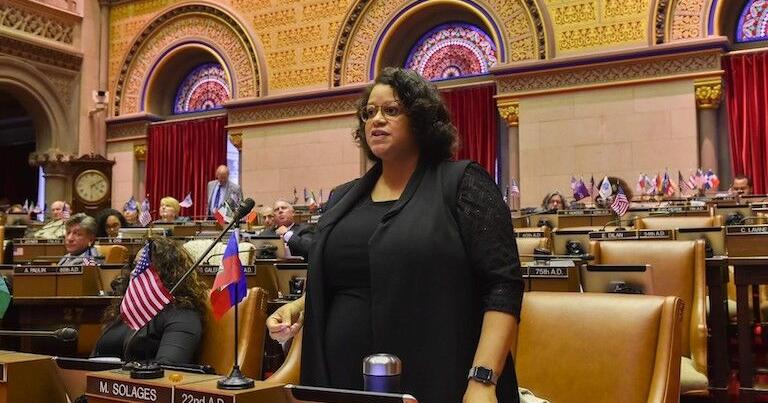
ALBANY (TNS) — A nine-member commission has the next year to study how reparations could be offered to descendants of enslaved people in New York.
The panel is charged with issuing a report to the state Legislature on how, or if, reparations could be made. It’s the result of a bill sponsored by Assemblywoman Michaelle Solages, a Democrat from Nassau County.
“Sometimes government is messy and in the beginning it might be difficult but we’re on our way there,” Solages said after an initial meeting of commission members last week broke down into some squabbling about leadership positions. “I just have hope for the future.”
Sen. James Sanders, a Democrat from Queens, carried the bill in his chamber.
“We have been gathered from the four corners of the Earth for a meeting 400 years in the making,” Sanders said. “But it’s also a humbling moment.”
SLAVERY IN NY’S PAST
Slavery existed in New York, particularly in the 1700s when some of the state’s most famous names used the practice — the Schuylers, the Livingstons, the Bergens and others.
That’s evidenced by a monument that was erected in lower Manhattan after workers excavating the site found a mass burial site where more than 15,000 free and enslaved Africans are estimated to have been buried.
It wasn’t until 1799 that the state Legislature approved a bill that would begin to gradually phase out the use of slavery and, even then, it wasn’t full abolition.
The law declared that any child born to an enslaved person after 1799 would be considered free but still have to act as a servant for their mother’s owner until a certain age. That was 28 for men and 25 for women.
It wasn’t until nearly two decades later that the Legislature would approve a second bill to abolish slavery outright. That was passed in 1817 and set 1827 as the year for full emancipation.
But as freedom drew near, New York’s earliest leaders began to create roadblocks for the state’s Black residents.
When delegates gathered to rewrite the state constitution in 1821, a section was added that removed the right to vote for Black men who did not own property.
That rule would later inspire philanthropist Gerrit Smith to offer more than 2,000 land deeds for plots in the Adirondacks to Black men living in New York City. The purpose was twofold: to give those men the right to vote and land to farm and earn an income.
Many of the deed owners never moved to the Adirondacks but kept the land to retain their voting rights. The rule wasn’t removed until after the Civil War with the passage of the Fifteenth Amendment.
‘DIVISIVE’ COMMISSION
It’s that history that inspired Sanders to write the bill that would create the new Commission on Reparations Remedies.
It was no easy feat; Sanders lobbied his colleagues in the Legislature for seven years before the bill passed in its final form. When it came to the floor, it passed along party lines with Democrats in favor. It was signed by Gov. Kathy Hochul in December.
Republicans were against it, and continue to be, because they don’t view the possibility of reparations for Black residents as realistic. Senate Minority Leader Rob Ortt predicted last year that it would raise costs for others.
“The reparations of slavery were paid with the blood and lives of hundreds of thousands of Americans who fought to end slavery during the Civil War,” Ortt said. “A divisive commission to consider reparations is unworkable.”
Since then, the state has laid the groundwork for the commission’s inauguration.
Hochul and leaders from the Legislature appointed the commission’s nine members in February. Two months later, they agreed to set aside $5 million in this year’s state budget for its operations.
That all led to last week, when the commission held its first meeting of what’s expected to be many over the next year.
THE PATH FORWARD
The next steps for the commission include confirming selections of chair and vice chair, hiring an executive director to organize efforts, and figuring out how to spend the rest of its money.
Those decisions will determine how they move forward with their work. The commission is allowed to hold hearings, solicit public input and obtain data from state entities that could help shape their findings.
But all of that will be difficult without help. None of the commission members are paid because they’re not expected to treat it like a full-time job.
“We have no staff at this point because of the constraints of the Open Meetings Law,” said member Jennifer Jones Austin, CEO of the Federation of Protestant Welfare Agencies, an anti-poverty, policy and advocacy organization. “I cannot understate the challenge we are facing without staff.”
The next meeting of the commission is expected to take place later this month.
(c)2024 the Times Union (Albany, N.Y.)
Visit the Times Union (Albany, N.Y.) at www.timesunion.com
Distributed by Tribune Content Agency, LLC.


